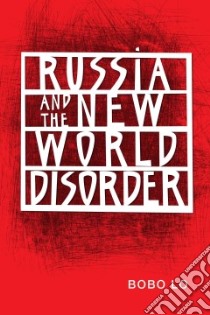- Libreria
- >
- Libri in lingua
- >
- Politica
- >
- Relazioni internazionali
Russia and the New World Disorder - 9780815726098
Un libro in lingua di Bobo Lo edito da Brookings Inst Pr, 2015
- € 30.80
- Il prezzo è variabile in funzione del cambio della valuta d’origine
Led by the ubiquitous Vladimir Putin, Russia has strongly reasserted itself on the international stage. In the worldview of Putin and the Kremlin, the inevitable decline of the West and rise of the rest provides an opportunity for Russia to fulfill its mission as an independent center of global power. What are the origins of this increasingly aggressive stance? What are the geopolitical ramifications? And what will be the likely outcomes? In this timely and accessible work, former diplomat and renowned Russia analyst Bobo Lo examines the interplay between contemporary Russian foreign policy and a global environment that has rarely been more fluid and uncertain.
Russia and the New World Disorder delves into Russian policy and geopolitics via three questions:
? How do Russia's domestic politics and external operating environment influence the Kremlin's foreign policy?
? How have policymakers in Moscow responded to that environment, and with what ramifications?
? What are the prospects for change, continuity, or regression in Russian foreign policy over the next decade and beyond?
Lo argues that Moscow's approach to regional and global affairs reflects the tension between two very different worlds. The Kremlin's belief in a weakening West and subsequent rise of Russia reaffirms traditional principles of international politics: collective leadership by the major powers, the dominance of hard power, the existence of spheres of influence, and the primacy of national sovereignty.
This idealized view, however, is the antithesis of the actual world that Russia faces today. It is defined by a new disorder that challenges many core assumptions. Its principal message is that only those states that embrace change will prosper. In this world, Russia is no longer able to rest on tradition and a sense of entitlement but must instead adapt to fluid international realities and redefine itself as a modern power.
Which of these two diametrically opposed worlds will Russia ultimately choose? This book makes clear that the next 10 to 15 years will be critical in determining whether Russia plays a leading role in twenty-first century politics, or ends up as one of the principal casualties of global transformation.
Informazioni bibliografiche
- Titolo del Libro in lingua: Russia and the New World Disorder
- Lingua: English
- Autore: Bobo Lo
- Editore: Brookings Inst Pr
- Collana: Brookings Inst Pr (Paperback)
- Data di Pubblicazione: 17 Agosto '15
- Genere: POLITICAL SCIENCE
- Pagine: 341
- Dimensioni mm: 228 x 152 x 0
- ISBN-10: 0815726090
- EAN-13: 9780815726098


